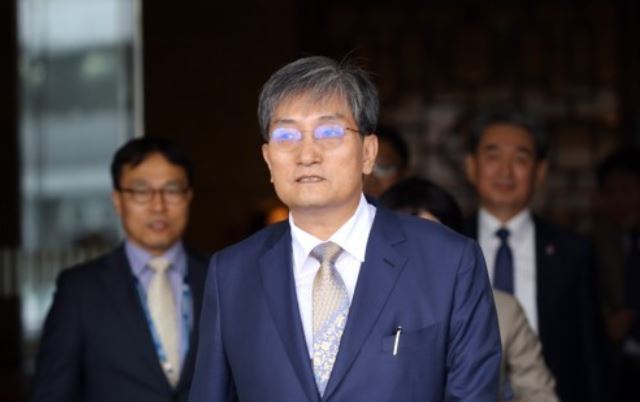BEIJING -- South Korea's new ambassador to China said Tuesday that consensus is growing that the ongoing dispute over a US missile defense called THAAD is "not desirable" for their bilateral ties.
"The feud prompted by the THAAD (deployment) cannot go on this way," Amb. Noh Young-min told reporters upon arriving in Beijing to start his duties. "I believe that the consensus is growing in both countries that it is not desirable to let economic relations (harmed) by the THAAD issue continue this way."

(Yonhap)
South Korea-China ties have been strained since Seoul announced in July last year it would allow the US to deploy a THAAD battery on its soil in a bid to better counter North Korea's growing missile threats.
China has strongly opposed the move, claiming that the new armament -- its strong radar system in particular -- hurts its strategic security interests and has demanded its withdrawal. It is presumed to have taken many retaliatory steps against South Korean goods and companies.
To resolve the deepening misunderstanding of the two countries, Noh underlined the importance of a summit, as well as more economic and cultural exchanges.
He also reiterated that it is important to provide "technical" assurance to Beijing about its THAAD-related anxiety, along with political and diplomatic efforts to ease any misunderstanding. He did not go into details, however.
With regard to North Korea's evolving nuclear and missile threats, the ambassador said that they are the "biggest" roadblock not just to peace and stability in the Northeast Asian region but to the national interests of South Korea and China as well.
Asked what would be his top priority as the Moon Jae-in government's first ambassador to Beijing, he said that he will prioritize national interests in carrying out his job but emphasized that he believes South Korea and China share the same understanding of what needs to be done for peace and stability in this region. (Yonhap)






![[KH Explains] How should Korea adjust its trade defenses against Chinese EVs?](http://res.heraldm.com/phpwas/restmb_idxmake.php?idx=645&simg=/content/image/2024/04/15/20240415050562_0.jpg&u=20240415144419)